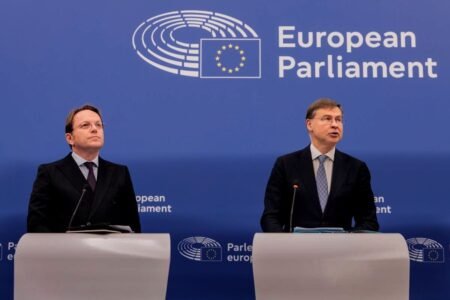The European Commission presented on 3 February Europe’s Beating Cancer Plan, a new EU approach to cancer prevention, treatment and care.
Advertisement
Why is the Commission presenting Europe’s Beating Cancer Plan now?
In 2020, 2.7 million people were diagnosed with cancer and another 1.3 million people lost their lives to it in the European Union. In addition to causing heavy physical and emotional distress for patients and those around them, it places a heavy burden on our health systems, our economy, and on our society. The overall economic impact of cancer in Europe is estimated to exceed 100 billion annually.
In all, Europe accounts for a tenth of the world’s population, but a quarter of the world’s cancer cases. By 2035 cases are set to increase by almost 25%, making it the leading cause of death in the EU. These figures highlight the EU’s need to step up its work on cancer with concrete policies. Moreover, the COVID-19 pandemic has severely impacted cancer care, disrupting prevention and treatment, delaying diagnosis, and affecting access to medicines.
Is the EU not already acting on cancer?
The EU has indeed been working to tackle cancer for decades. Its actions include tobacco control and protection from hazardous substances, which have already contributed to saving and prolonging lives. However, the last European action plan against cancer was developed in the early 1990s. Since then, initiatives on cancer prevention and control have included the European Commission Initiative on Breast Cancer (ECIBC) and the European Cancer Information System (ECIS), both coordinated by the Joint Research Centre. The Health Programme has also contributed to joint actions on European Partnership (EPAAC), comprehensive cancer control (CANCON), Innovative Partnership on Action against Cancer (iPAAC) and the European Code Against Cancer (ECAC).
The world has seen major progress in cancer treatment in the years since those initiatives were launched. Personalised medicine tailored to individual situations and needs has radically changed patients’ prognoses. Meanwhile, research and innovation with the help of digital technologies, have dramatically advanced our understanding of cancer initiation and progression, prevention and diagnosis.
Europe urgently needs to renew its commitment to cancer prevention, treatment and care that recognises the growing challenges around cancer and reflects the developments in cancer care. A comprehensive approach across government is needed that focuses on the patient and harnesses the potential of new technologies and insights; strengthens cooperation; eradicates inequalities in access to cancer knowledge, prevention, diagnosis and care; and delivers improved health outcomes to patients.
What is the Commission presenting today?
Europe’s Beating Cancer Plan is a key pillar of a strong European Health Union, as presented on 11 November 2020, calling for a more secure, resilient and better-prepared European Union.
The Cancer Plan presented today takes a new approach to cancer prevention, treatment and care by maximising the potential of new technologies. It contains concrete, ambitious actions that will support and complement Member States’ efforts to reduce the suffering caused by cancer.
Over the coming years, the Cancer Plan will concentrate on research and innovation, and further study the potential of digitalisation and new technologies. The Cancer Plan will mobilise financial instruments to support Member States. With its policy objectives, supported by ten flagship initiatives and multiple supporting actions, the Cancer Plan will help Member States turn the tide against cancer.
It will enable the sharing of expertise and resources across the EU by supporting countries, regions and cities with less knowledge and capacity. The Cancer Plan will help researchers to exchange findings between small and large Member States, and to have access to crucial health data on the potential causes of cancer and promising treatments for it. Through its actions and initiatives, medical staff and hospitals will be able to tap into a wealth of shared information, ensuring that patients across the EU can benefit from better care and treatment.
A broad range of EU policies will support the Cancer Plan with digitalisation, research and innovation as the starting point for a new approach to cancer care in the EU. Actions will range from employment, education, social policy and equality, through marketing, agriculture, energy, the environment and climate, to transport, cohesion policy, and taxation.
Is the Cancer Plan taking into account lessons from the COVID-19 pandemic?
Yes. The pandemic has significantly affected the entire cancer pathway. It has disrupted cancer treatment, delayed screening, and affected access to medicines. It has also affected the quality of life and follow-up care for patients. The Commission has maintained regular, close contact with stakeholders and targeted consultations have been organised with key associations to discuss the impact of COVID-19 on cancer patients and treatment.
Europe’s Beating Cancer Plan incorporates the lessons learned from the pandemic and addresses the impact of COVID-19 on cancer by reinforcing coordination and establishing effective partnerships as well as increased focus on vulnerable groups. One concrete action of the Cancer Plan is to take into account the lessons learned of the Covid-19 crisis to develop contingency planning to respond to similar events in the future. Other actions in this area include strengthening and integrating telemedicine and remote monitoring in health and care systems by supporting research, innovation and deployment actions with EU funds.
What actions will the EU be taking on alcohol?
Europe has the highest levels of alcohol consumption in the world and alcohol-attributable cancer is a major health concern. In spite of this, awareness of alcohol as a risk factor for cancer is low. Strengthening alcohol control policies is necessary to prevent alcohol-attributable cancer cases and deaths. The Commission will therefore support Member States to implement a wide range of policies such as reductions in alcohol affordability and availability, limits on advertising and promotion, and raising awareness about the risk of alcohol consumption and cancer.
In addition, the Commission will review EU legislation on the taxation of alcohol. It will also review EU tax legislation on the cross-border purchase of alcohol products. A public consultation is currently ongoing on this matter.
What actions will the EU be taking on tobacco?
Cigarette smoking and other forms of tobacco use is responsible for 15-20% of all European cancer cases, making this the top avoidable risk factor. As well as dealing with traditional tobacco products, addressing the next generation of tobacco and related products will remain a priority as new products such as heated tobacco and others continue to enter the market. Young people need to be protected from picking up lasting habits that are damaging to health.
The Plan will put forward actions to help create a ‘Tobacco-Free Generation’ by taking a comprehensive approach to tobacco, including:
- a review of the Tobacco Products Directive to make product regulation stricter,
- reviewing the Tobacco Taxation Directive in order to revise EU minima taxation rates for tobacco products and to harmonise the taxation of novel products,
- reviewing EU tax legislation on cross-border purchases of tobacco products: a public consultation is currently ongoing on this matter,
- addressing tobacco advertisement, promotion and sponsorship in social media and online services, and,
- supporting Member States in implementing the WHO Framework Convention on Tobacco Control.
The Commission will propose an update to the Council Recommendation on Smoke-Free Environments and recommend extending its coverage to emerging products, such as e-cigarettes and heated tobacco products. The Cancer Plan will also give new impetus for Member States to improve the enforcement of existing legislation within their overall tobacco control strategies, including sales to minors and smoking cessation campaigns.
What actions will the EU be taking on food?
Diet can influence cancer risk many years before the diagnosis of cancer, already during childhood. Diets with ample intake of fruits and vegetables, whole grains instead of refined grains, and low intake of red meat and processed meat, sugar-sweetened beverages, and salt will reduce the risk not only of cancer, but also of cardiovascular disease, diabetes, and overall mortality.
The Commission will evaluate the 2014-2020 EU Action Plan on Childhood Obesity and propose a follow-up. There will be strong synergies with the Farm to Fork Strategy and the Commission will propose a revision of the EU school fruit, vegetables and milk scheme to make healthy products more available to children.
The Commission is undertaking a review of the promotion policy for agricultural products, with a view to enhancing its contribution to sustainable production and consumption, and in line with the shift to a more plant-based diet, with less red and processed meat and other foods linked to cancer risks and more fruit and vegetables.
The Cancer Plan will launch the ‘HealthyLifestyle4All’ campaign in 2021, involving key sectors promoting sport, physical activity and healthy diets.
What will be funded under the plan and how?
The Plan will make full use of all available funding instruments, with a total of 4 billion being earmarked for actions addressing cancer. This includes a substantial share of the new EU4Health Programme from which 1.25 billion will be used to support cancer actions.
In addition, the new Horizon Europe Framework Programme for Research and Innovation could provide a total of 2 billion to support the proposed Mission on Cancer and other cancer-related research projects, while Erasmus+, the European Institute for Technology and Marie Sklodowska-Curie actions could provide up to a total of 500 million for projects in education, training and research in the field of cancer. The Digital Europe programme will focus on digital investments, electronic data and digital skills, providing financial support of up to 250 million for cancer-related projects.
In addition, Cohesion Policy Funds, such as the European Regional Development Fund, the Cohesion Fund and the European Social Fund Plus can be used by Member States and their regions to improve their health systems’ resilience, accessibility and effectiveness. Eligible actions range from health promotion and disease prevention, improving access to early detection and screening, to treatment, as well as research and development projects.
Under the ‘Next Generation EU’ budget and recovery plan, an unprecedented Recovery and Resilience Facility, with a budget of 672.5 billion in non-repayable support and loans, is being created to finance reforms and investments. These funds can also be used for investments in health infrastructure, equipment, digital transformation of healthcare, or manufacturing capacity for medicines and medical devices.
These instruments are under shared management, and Member States will be responsible for setting priorities on the basis of their needs, and to carry out these projects. The Commission strongly encourages the Member States to make full use of all these options to implement the measures included in the Cancer Plan. To facilitate the use of EU funding instruments for cancer investment, the Commission will set up a knowledge sharing mechanism to inform Member States about the different EU mechanisms and how they can be utilised.
Will the Member States and the private sector also financially contribute?
Cancer-related investments by Member States and public and private entities could also be mobilised through EU budget guarantees, for instance through the InvestEU programme.
It will offer loans and equity financing for investments in hospitals, primary care and community care facilities, eHealth, the healthcare workforce, and in innovative health products, services and care models.
What is the time span of the plan?
There is no end date for the plan, but it will be regularly reviewed for the first time by the end of 2024. This review will assess whether the actions taken are sufficient to achieve the objectives, or whether additional measures are necessary.
What are the next steps?
The Cancer Plan will already be examined by the Member States at a Health Ministers’ meeting scheduled during the Portuguese Presidency of the EU. The Commission will continue to work together with the European Parliament’s Special Committee on Beating Cancer (BECA).
Communication on Europe’s Beating Cancer Plan
Annex to the Communication on Europe’s Beating Cancer Plan
Source: European Commission







